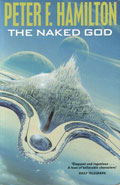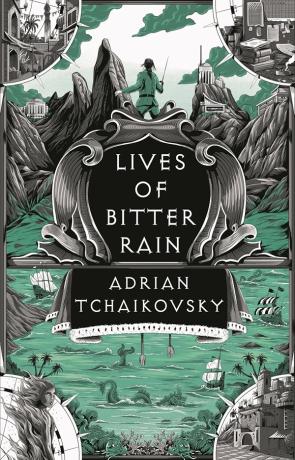Interview with Peter F Hamilton
 This Interview with Peter F Hamilton was carried out by TC in October 1999.
This Interview with Peter F Hamilton was carried out by TC in October 1999.
On his resent signing tour Peter F. Hamilton did a stop in Copenhagen on the 27th October 1999. I got half an hour with the author of the just released The Naked God.
Some parts of this interview are about things taking place in The Naked God. Reading them will spoil it for you. I've greyed the text in these parts, making them hard to read (Like this). You can highlight them with your mouse or cut and paste the text to an editor, if you want to read these parts. For those of you on black and white screens, I've put the text [Spoiler-Start] at the start and [Spoiler-End] and the end of these parts.
TC: I thought of starting with a few question about the Nights Dawn's Trilogy
PFH: Sure…
TC: Where does the Joshua character come from?
PFH: He's a build up of a lot of people, because he starts off an appalling person, basically, and then matures through the series. He's what space opera heroes were like when I was in my teens. They have a girl in every port, they are superb pilots, young, rich, and stylish. All those kind of things, but in those bits they were all good points for them, I wanted to make him, not unlikeable, but somebody you would certainly avoid at a bar.
TC: Was it hard balancing that – there are times where he seems so perfects that it's hard not to hate him.
PFH: All characters, are always a balance between the good side and the bad side that builds good characteristics that you like. Quinn was also a lot of fun to write, but he was difficult because he was almost stereotyped evil. Until you get to volume three and then find out why he was that evil – he was actually somebody's ideal of evil and he was …
TC: A product…
PFH: Yes, made to be evil.
TC: The Bi-tech of the series. What was the inspiration for that?
PFH: That came out of Edenism, which came out of the affinity technology. I had written short stories before I started writing the trilogy that dealt with the affinity technology, so Edenism was sort of an extrapolation of where affinity would take us.
TC: In a Second Chance at Eden…
PFH: Yes, Sonnies Edge and some of the other stories features affinity technology, so that was born out of that and then it just went on from there, it's extrapolating what you can do the with technology and where you could put a living habitat in space and where it would get enough energy, which is the magnetic field of planets. And if you can do that, why can't you have spaceships as well, so I just build from one level to another. It just builds up.
TC: Okay, so it's not something you wanted in the story and built the story around?
PFH: No.
TC: Did you want them to be able to be possessed? Was that the reason you wanted them?
PFH: No, it wasn't, actually. No. That particular culture, Edenism, had to have biological spaceships, to make sense I felt, because that is their technology (bio technology).
TC: Do you have a writing routine?
PFH: Typical day; In the morning I look over what I did yesterday. Spellcheck it, go through it, add to it and change sentences, that kind of thing – revise it. So that by late afternoon I am where I left off yesterday. Then I'll start writing fresh stuff – into the night.
TC: Do you use any tool to keep track of the characters?
PFH: Just piles of notes and what's in my head.
TC: What kind of books do you read? If you can find any time for reading at all…
PFH: I read very little at the moment, 'cos I don't read while I'm writing. I'm finishing off Kim Stanley Robinsons Mars trilogy and I read Stephen Baxter, for instance.
TC: That's mostly hard stuff…
PFH: Yeah.
TC: Do you read any of the (other) new British writers, like Banks…
PFH: Yeah, I read Iains stuff – I just finished his latest Cultures novel – Inversions. I've read Christina Robson (?), who's a new British SF writer, so yes, I do read some of the new stuff.
TC: From where I sitting I'm seeing a revival of the British SF scene, but I'm seeing it from the outside…
PFH: Yeah, people say this – there's a lot of people like myself, Stephen Baxter, Poul McAuley, all sort of came out of Interzone of the late 80's, early 90's, we all sort of started writing for that. Interzone started in the early 80's. I think, and by the late 80's it had hit it stride. It attracted a lot of us into it.
TC: So a bit like it happened in the beginning of the golden age with…
PFH: … [John W.] Campbell, yeah, well on a slightly smaller scale, but yeah, and now others are coming along.
TC: How do you feel about the touring, the signing and the giving interviews to strange people?
PFH: How I feel about it, well it's been five weeks and … Well, touring – it's well nice, it's an interesting break, but I shall be glad when I get home.
TC: Is it [the touring] business or is it just seeing the world at your publisher's expense? Does it actually sell books?
PFH: Yeah, otherwise they wouldn't send me on them – the publishers send me on these tours – so it must help publicise quite well.
TC: There weren't that many people here in the beginning [in the store] – are Science Fiction fans too shy to meet their authors?
PFH: Most of the ones that have turned up haven't been shy. No, they have all asked their questions, they didn't seem shy to me, but maybe they were the ones that stayed home.
TC: I read a review of the Naked God where the reviewer thought that the ending was … not grabbed out of the air, but maybe a bit too easy… how do you feel about reviews like that?
PFH: It certainly wasn't grabbed out of the air – it has always been that ending.
[Spoiler-Start]
It was left so that the whole problem of possession and life after death hadn't been solved. What happened was that they where given a breathing space and now the society might finally get its whole act together and change. That was a most deliberate ending, in that way.
TC: You do give Joshua Godlike powers…
PFH: Very briefly.
TC: Briefly, but he is in control and maybe the objection is that it makes it too easy for him to select an optimum solution.
PFH: Well, volume three was basically about laying out options. The various plot lines – there's the one on Norfolk, which wasn't actually a bad way to live, once the initial possession had gone off and moved for the next generation. That would have been quite pleasant world to live on. There's the Mortonridge option, in which you just declare total war on everything, which while it sort of works, is not at all what you want. There's the eternal struggle between B7 and Quinn Dexter, where they hold each other at bay, but nothing is achieved. So there's all these various options and somebody has to choose.
[Spoiler-End]
TC: Speaking of Norfolk, this separation between different cultural and ethnical groups, do you see this as a viable solution to the problems that we have today?
PFH: Today?
TC: We have the dark side of this today – the ghettos.
PFH: The Confederation was put together as a reflection of what I see today – we are all dividing more and more into fractions, certainly in the UK, we have Scotland and Wales now having their own parliaments and assemblies. So in a way it was a reflection of this small-scale nationalism – in the book it's as a short-term solution to our problems, getting away from the problems of the past, but it's not a long-term solution.
[Spoiler-Start]
People just took the first step and now they take the second, which is why book three ended as it did. Change finally came to the Confederation, but it wasn't something that happened internally, it was because of the conflict out side, that they had to change again. We've left them at the dawn of what could be a Golden Age. If they get it right this time.
[Spoiler-End]
TC: So the separation is only a intermediate step towards getting the race together again.
PFH: Yes, exactly. The problem of the life after death is so big that we have to confront it together. It's no good everybody going their separate ways and not talking to each other.
TC: Okay, a few last questions: How did you feel when you typed the last letter of The Naked God.
PFH: Oh, The End. Eh… Relief, that I had finally got it done. It was like waving goodbye to friends that you got on a holiday and you know that you are not gonna se again. It was that kind of slight sadness, because I had had these characters with me for six and a half years, so yeah a bit of both. Relief and a what-do-I-do-now feeling.
TC: Your favourite character?
PFH: Louise.
TC: She's the one you miss the most?
PFH: Yeah, and the reason I like her is that she learns the most from her experiences. She starts oof in a society which is very very ridged. She's actually quite well oof, she's at the top of it, but because she has got an reasonable open mind on the journey she takes through the Confederation she sees that all through she's okay others aren't. Again it's the change thing. Norfolk needs to change. Which you can't do suddenly. Even Joshua recognises this.
[Spoiler-Start]
Remember the epilogue? Where he's just making tiny changes at the button, which will have to lead up to the whole society changing. You can't impose drastic changs on people, they have to be lead gently. Certainly with as big a change as is needed.
[Spoiler-End]
TC: So Louise's story is a coming-of-age story within a coming-of-age story?
PFH: Absolutely, yeah, absolutely.
TC: Last question: Any approaches from Hollywood?
PFH: No, I don't think that it's filmable, The Night's Dawn, it's too big, it's too complicated. You could maybe take one story out of it and film that, but I don't see the point of that.
TC: Have you thought about getting it done into a comic strip?
PFH: No, but if they showed me what they wanted to do and it looked good, I can't see why not.
TC: Okay, thank you for your time.
PFH: Thank you!
I want to thank Peter F. Hamilton for being such a nice guy. He's publisher at MacMillian for the same. The guys at Fantask for letting me "borrow" PFH from under their noses. Thanks!
